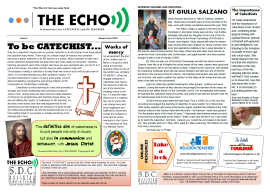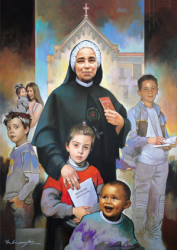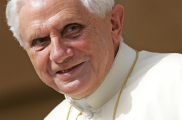More about SDC
PRAY and REFLECT
Other issues
Issue 4: Autumn 2016
Download the pdf version of this issue by clicking here.
The word ‘CATECHIST’ comes from the Greek word meaning ‘to echo’. As Catechists or teachers of RE we do not proclaim our own word. We echo the message of Jesus Christ our Lord. This newsletter aims at providing parish catechists and teachers of RE in schools some support in terms of reflections, ideas, useful resources they can use and so on. Feel free to share with other colleagues and friends. There is also a pdf version which you can download by clicking on the thumbnail below.

| In this issue |
| To Be a Catechist ... |
| Works of Mercy |
| Inspiring Teachers and Catechists - St Giulia Salzano |
| The Importance of Catechists |
To be a Catechist ...

Why be a catechist? Anyone who is a parish catechist or an RE teacher must have asked that question many times. There may be a whole range of reasons why someone becomes a parish catechist or an RE teacher in a school. Many volunteer to help out in parish catechism programmes because they have been asked by the priest. Teachers naturally get paid to teach their subject. But have you ever wondered why you do it? Is it just for the money, the praise, the fact that you were asked to help out?
The purpose of being a catechist is to help those we come in touch with to get closer to Jesus. It is not like teaching any other academic subject. It is not about teaching for a test or to get a good grade. It is not about completing a programme and giving children a First Communion or Confirmation Certificate.
Catechesis is about teaching in a way that promotes a stronger and closer relationship with someone so special - Jesus Christ. Unless those we teach become better followers of Christ as our programmes and teaching moves along, we are not fulfilling the ‘object’ of Catechesis or RE teaching. As we start a new school year and new programmes for the sacraments and start planning our sessions it is good to stop and reflect about whether we and the programmes we run are truly leading those in our groups or classes becoming more intimate with Christ.
Works of Mercy

As we approach the end of this Jubilee year of Mercy it is good to think about the fact that teaching others is one of the SPIRITUAL WORKS OF MERCY. When we engage ourselves in catechesis and instruction about our Faith we are at the same time showing mercy to others. A Catechist helps others not in a material way but in a way that can change lives and bring happiness and fulfilment to those who accept the invitation to enter and be active members in the Church – this big family of God, Our Merciful Father.

The definitive aim of Catechesis is to put people not only in touch, but also in communion and intimacy with Jesus Christ.
(From the "General Directory for Catechesis, paragraph 80).
Inspiring Teachers and Catechists - ST GIULIA SALZANO

Giulia Salzano was born in 1846 in Caserta, southern Italy. These were turbulent years in most countries of Europe, even with bloody revolutions around the year 1848.
Her father, Diego, a captain in the army of King Ferdinand II, died when Giulia was just four. Her mother, Adelaide, entrusted her daughter to the care of the Sisters of Charity in the Royal Orphanage of St Nicola la Strada, near Naples. Giulia stayed with them for eleven years during which they shaped her strong Catholic character and aspirations instilling in her a great devotion to the Sacred Heart of Jesus and for the rosary. When she was eight years old she received her Holy Communion and Confirmation, and aged fourteen she was resolute enough to take a vow of chastity (1860).
By 1865 she was out of the Royal Orphanage and with her family moved to Casoria. Here like in all of Naples the social needs of the lower classes were great and Giulia continued to fan in her the desire to teach. Helped by the commune, she studied for a teaching certificate when she was about nineteen and she was one of the first teachers in the primary school of Casoria. Her teaching enthusiasm was also shown out of school: she used to gather the children on the steps of her house and educate them in the faith for the sacraments.
Later on Giulia also started meetings for other groups - mothers and even workers. During the month of May she also encouraged the devotion of the rosary for everybody and talked about it in the Carmelite Church. Her evangelising enthusiasm for teaching the catechism knew no bounds: she used to say that she wouldn’t rest “till all Casoria knew how to truly serve God.”
Giulia’s fervour grew when the new Pope, Pius X (1903-14), in his very first encyclical encouraged the teaching of catechism in every parish. So in November 1905 Giulia, together with some of her former pupils, founded the institute of the Catechetical Sisters of the Sacred Heart with the motto: “Ad maiorem Cordis Iesu gloriam”: “For the greater glory of the Heart of Jesus.” Catechesis and teaching meant so much to her that she emphasised to her sisters: “While I have any life left in me, I will continue to teach the catechism. And then, I assure you, I would be very happy to die teaching.” She actually died on 17 May 1929, aged 83, after examining 100 children for their First Holy Communion.
Her feast day is 7th May.
The Importance of Catechists

“St Giulia understood well the importance of catechesis in the Church and, combining pedagogical training with spiritual fervour, dedicated herself with generosity and intelligence, contributing to the formation of people of every age and social class. She would repeat to the Sisters that she wished to catechise to the very last hour of her life, showing with her whole self that if ‘God created us to know him, love him and serve him in this life’, it is necessary to put nothing before this task’.”
From the homily of Pope Benedict XVI at the Canonisation Mass of St Giulia Salzano.
Download the pdf version of this issue by clicking here.

Follow us on